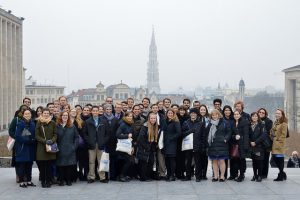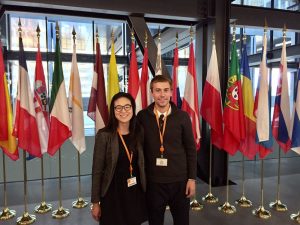Ian Shirley, 2017-2018 Fulbright Graduate Researcher at the Instituto Catalán de Nanociencia y Nanotecnología (ICN2), was selected to represent Fulbright Spain at the EU-NATO Seminar. Every year, the Fulbright Commission in Belgium and Luxemburg invites a total of 45 grantee representatives from Fulbright Programs within the EU to travel to Belgium and Luxembourg for a four-day EU-NATO Seminar.

With snowflakes floating in the duskily-lit courtyard of the College of Europe in Bruges, the newly minted professor Anthony Gardner spoke to a rapt group of Fulbrighters about today’s turbulent political landscape. Just two weeks earlier (at the hour, precisely, of Trump’s inauguration), Professor Gardner’s role as U.S. Ambassador to the European Union ended – his words to us were backed by the still-fresh insight of the job but unhindered by its obligations. Echoing some remarks he recently made on CNN, he forcefully criticized the new administration’s flirtation with the breakup of the EU and lamented popular American misconceptions of its institutions as undemocratic and dysfunctional and of the eurozone as weak.
Anthony Gardner’s realistic yet optimistic commentary in that fairytale town was the closing act of the 2017 EU/NATO seminar hosted by the Belgium Fulbright Commission. Over the course of four whirlwind and exciting days, 50 American Fulbrighters with grants to 19 European countries visited key EU and NATO institutions in Luxembourg and Belgium. After an introduction to the EU at the U.S. Embassy to Luxembourg, there were stops at the European Court of Justice, the Bastogne War Museum, the European Commission, the U.S. Mission to the EU, and NATO Headquarters. Fortified by Belgian beer, fries, and waffles, we learned about the structure and functions of these institutions, contextualizing them historically and understanding their current role in international relations.

The European Court of Justice in Luxembourg, with its tall ceilings, severe chandeliers, and obsessive gilding, is a fantastically imperial building. On the first morning of the seminar, we sat in on the hearing of a case on competition law presided by eight robed judges, gazing coolly down on us. The lawyers were understandably nervous as they gave their opening remarks, but the real fireworks began when the judges started asking questions. In one memorable exchange on economic theory, a judge found the prosecuting lawyer’s use of the term “value” to be, and I quote, “disturbing.” After the hearing, two Fulbright alums, Koen Lenaerts[1] (the President of the ECJ) and Paul Nihoul (a judge at the General Court), gave us a relaxed and unintimidating insider’s perspective on the broad goals and inner mechanics of the court, and then joined us for lunch.
A bucolic drive north through Belgian countryside dotted with sheep brought us to Brussels, and there we spent the next morning visiting the European Commission. We had for us painted a picture of the EU in broad brush strokes – the treaties that define it and give it power, the various institutions tied together in a system of checks and balances, and some major policies of the EU were all presented in a series of talks.[2] As Anthony Gardner admonished, the EU is an effective and democratic collaboration with both hard and soft power. Ricardo Borges de Castro, of the European Political Strategy Centre (and yet another Fulbright alum), was the last speaker at the Commission. He gave us an overview of the EU’s foreign and security policy, and also a challenge. «When you go back to your homes,» he said, «you have to demonstrate to your fellow Americans why the EU is important to the U.S.» In the face of a drastic shift in tone coming from the White House on U.S.-EU relations, and given that on-the-ground diplomacy is a large part of the Fulbright mission, this is a timely, appropriate, and important task.[3]
Overall, the seminar could not have been held at a more interesting and tumultuous time. Throughout the week’s Q&A sessions with diplomats, judges, and analysts, and in conversations with other Fulbrighters, the pressing issues of the moment – Trump’s presidency, Brexit, migration, right-wing populism in Europe – were raised incessantly. How does diplomacy change under Trump’s policy of “America first?” Was Brexit inevitable? Will President Erdogan renege on his refugee deal with the EU and “open the gates” in time to influence upcoming elections in France, the Netherlands, and Germany? Some (off the record) answers were cynical, some measured and careful, others no-nonsense and pragmatic, but no one seemed very enthusiastic about the tenor of recent events. There was an undercurrent of shock and uncertainty at this conference that, I imagine, was not quite so tangible even a year ago.
However, before Anthony Gardner’s comments at the College of Europe brought the seminar to a close, we were privileged to hear some of the Fulbright-Schuman grantees speak about their research. Presentations from such engaged, capable, and passionate peers on constitutional law, food quality policy, multi-level governance, migration, and environmental policy provided a refreshing shot of optimism to end the week. The future, as they say, is in good hands.
Thank you to the Spanish Fulbright Commission for supporting my attendance, and to the Fulbright-Schuman program for hosting such an enlightening and motivating seminar!
——————————————————————————————————————————————————-
[1] Lenaerts has what can only be called a Fulbrihgt “Who’s who?” story: during his time at Harvard he took a class on comparative politics with his counterpart on the Supreme Court, Chief Justice John Roberts. The class was taught by another justice on the U.S. Supreme Court, Stephen Breyer.
[2]For an overview on the EU please see: The European Story, How the European Union Works, and The Junker Commission 10 priorities.
[3] My argument for the importance of the EU to the U.S. would go something like this: First and foremost, the existence of the EU coincides with the longest period of European peace in written history. This peace, fostered by economic interdependence and freedom of movement, is essential for global stability and prosperity. To frame the issue solely in terms of U.S. interests, trade (the Single Market makes the EU a stronger trading partner), diplomacy (it is much easier to negotiate directly with the EU than bilaterally with the 28 member states), and security (close collaboration with a united EU makes prevention of terrorist attacks in the EU or the U.S. more effective) are all more effective with a unified EU. From another angle, the legislation put into practice by 28 independent countries (on environment, migration, human rights, and so on) can be held up as an example for a U.S. whose policy in these areas is straggling. But most importantly, this collection of strong democracies has been one of our closest friends for the 60 years of its existence. The member countries of the EU are stronger, more prosperous, and more peaceful working together than on their own. We want our friends to thrive, do we not?